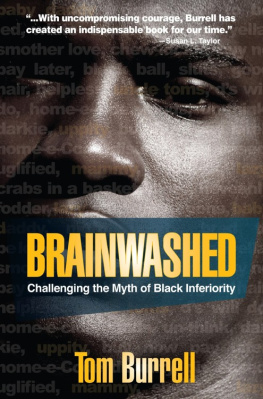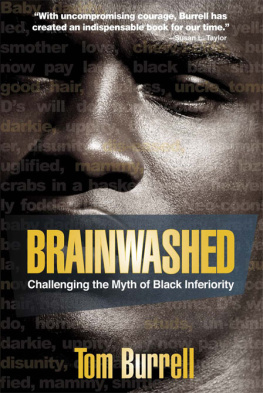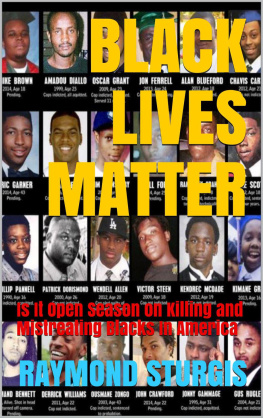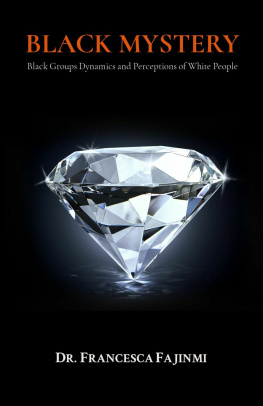Why Do We Conform to
Black Sexual Stereotypes?
love seems with them to be more an eager desire, than a tender delicate mixture of sentiment and sensation
THOMAS JEFFERSON
B y plan or by circumstance, the April 2008 edition of Vogue magazine garnered worldwide attention. It wasnt because it featured the first black man ever on its cover. No, the controversy was linked to Vogues decision to personify a classic American stereotype.
With his towering 6-foot-8 frame, anchored by size 16 shoes, NBA star LeBron James, nicknamed King James, struck a familiar pose on the magazines covergorilla-like, baring his teeth, flexing his muscles, with one hand dribbling a ball, the other clutching the tiny, slinky waist of white, blonde supermodel Gisele Bndchen.
Kong on the Court
The criticism was swift and furious. Sport columnists and cultural commentators accused editors of the influential fashion magazine of monkeying around with Jamess image, evoking the centuries-old stereotype of the black savage in search of the prized white woman to give their annual issue devoted to size and shape a little extra thrill.
Others noted that the image by famed photographer Annie Leibovitz was eerily similar to a 1933 King Kong movie poster in which the giant, raging, dark ape carries off a fair-skinned damsel in distress.
I was just having fun with it, LeBron told reporters, dismissing the controversy. We had a few looks and that was the best one we had. Everything my name is on is going to be criticized, in a good way or a bad way. Who cares, honestly, at the end of the day?
Who cares? We all should. Heres why: In framing King James as King Kong, Vogue, which reaches 1.2 million readers a month, perpetuated one of the most enduring stereotypes of black sexualitythe Brute. He is the oversexed, menacing black man, inherently violent, destructive, and shady. He appears on MTV as the gun-wielding, muscle-bound rapper 50 Cent, in the film New Jack City as a vicious crime lord played by Wesley Snipes, and throughout pornography as the well-endowed Mandingo stud ravaging the purity of white women.
LeBron may have been having fun, but little did he know he was playing with an ugly, debilitating stereotype that dates back several centuries.
Super-Sexed
Two powerful slave-era images are still active, still distorted, still damaging andthanks to our Black Inferiority Complexstill perpetrated by our own people:
BRUTE (broot): noun: a nonhuman creature; beastial/animal qualities, desires, etc.; adj: animal; not human/not characterized by intelligence or reason; irrational/savage; cruel (source: Dictionary.com)
JEZEBEL (jez-uh -buhl ): noun: a woman who is regarded as evil and scheming; a wicked, shameless woman (source: Dictionary.com)
Surely, we all know someone who fits the mold of the black brute or the gold-digging black Jezebel. If not personally, weve seen their amplified personas via televised media and marketing images, pop literature, or on saucy music videos. As with black family dysfunction, we are familiar with the contemporary manifestations of the Studs and Sluts phenomenon.
Studs and Sluts Dynamics
1. Studs on the hunt: Men who define themselves by their sexuality and sexual exploits.
They are constantly on the sexual hunt with self-worth directly tied to their conquests and sexual performance. Sex is a higher priority than job advancement, fatherhood, or real relationships. They will risk all in the pursuit of the quarry. They cannot (and will not) get too involved with their conquests. They have an internalized brutish nature: Im doing this to you, not with you is their mantra. They animalize, dehumanize, and objectify women to reinforce the idea that they are unworthy of emotional commitment and long-term involvement.
2. Gold-digging slut: Jezebel-like sex objects believe that, to get anywhere in life, they have to be really good at it. Sex is their ticket, their money-maker.
Gold-diggers allow themselves to be conquests in return for material gain (dinners, jewelry, rent, or a starring role in a video). They are conditioned to devalue sex. Their innate emotions and need for tenderness, compassion, and love are constantly repressed. They believe they are unworthy of love and respect, and avoid disappointment at all cost.
3. Gotta do whatcha gotta do: Sex as a means of sustenance and immediate gratification. Sex without emotion.
Defensive self-devaluation justifies their sensation-driven life. Propaganda validates their actions. Sexual behavior is legitimate and necessary to make it. They disassociate themselves from their bodies and the possibility of a legitimate means to holistic, authentic love.
Yes, we know studs and sluts exist. But here, we attempt to understand why and examine the impact these stereotypes have on a race still in need of therapy. Lets decode the enduring legacy of the Brute and the Jezebel.
Ape by Association
We believe that even among people who arent particularly prejudiced, the association between blacks and apes is still strong, held in place through implicit knowledge, the result of a lifetime of conditioning, rooted in historical representations of blacks as less than humanIt was a kind of racial programming, a legacy even something as progressive as Obamas election cannot obliterate.
Phillip Atiba Goff and Jennifer L. Eberhardt, social psychologists
The belief that blacks are sexual savages descended from fiction rooted in the first impressions of Africans. Englishmen were introduced to the chimpanzee and black Africans in western Africa at the same time and place. The startlingly human appearance and movements of the chimpanzee aroused their imagination.
According to A. Elaine Brown Crawford, as early as the mid-1500s, English explorers and traders who traveled to Africa mistook the semi-nudity of Africans as lewdness. They also misappropriated the cultural tradition of polygamy as uncontrollable lust.
In European eyes, the warfare, diet, and other aspects of African life they encountered placed Africans among the beasts. Africa, seen as the dark continent, possessed a natural landscape upon which lions, zebras, and other exotic wildlife flourished. Therefore, the people in this strange geography surely merited comparison with the beasts with which they co-existed.
The grand pooh-bah of the Founding Fathers, Thomas Jefferson, helped legitimize the belief that blacks are akin to apes. In his Notes on the State of Virginiathe most widely read book of the periodJefferson argued that blacks prefer the superior beauty of whites as uniformly as is the preference of the Oran-ootan for the black woman over those of his own species.
Size Matters
On the South Side, all the white men and white women would come to the clubs to try to get black women and black men. It was a mixer. In those days, the penis thing was so damned powerful that white women were not frightened. Theyd come and drive to your neighborhood, coming to look for it. Theyd ask you, Do you have a big one?
Ron
Ron, a 74-year-old artist, and I were born in the same eraabout 73 years after black slaves were emancipated. It was a time when we still navigated in the dark eddies of harsh racial undercurrents. Loving, interracial relationships were still deadly taboo, especially between black males and white females. White men, however, could use black women for sexual gratification without social condemnation.
These men inherited a system designed to keep them advantaged and empowered. Those cunning 17th-century colonial leaders managed to establish a code of behavior that gave white men the best of both worldsunfettered access to black women, while barricading black men from white women.
Next page






